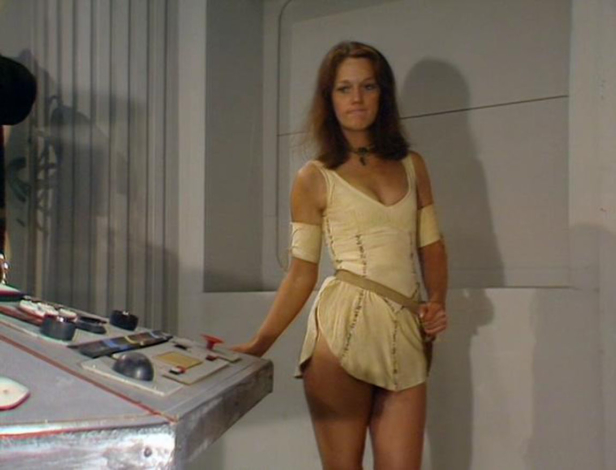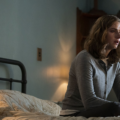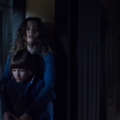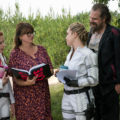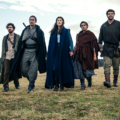Louise Jameson captured the hearts of a generation as savage Leela alongside Tom Baker in Doctor Who, and is recognised for her starring roles in The Omega Factor, Tenko and Eastenders, as well as her impressive list of theatre credits.
SciFiNow talked to Louise last year about her genre roles, watching Doctor Who with her family and women on television.
SciFiNow: You appeared with [Radio One DJ] Mike Raven in the film Disciple of Death…
Oh my goodness! You dug that one up!
We’d be very interested to know what that experience was like.
Louise Jameson: It was extraordinary. We actually had a wonderful time. There was me and Marguerite Hardiman and Virginia Weatherall, and the three of us really chummed up. We had a little cottage down in Boscastle. It honestly felt more like a holiday than a job. It was extremely social. In those days it was, you know, forty miles to the nearest cinema or station, so it felt a bit like being The Prisoner. Every time you wandered away they’d be like ‘where are you going?!’ No mobile phones or anything to track us down.
Mike Raven was very interesting. He wore black all the time, as did his wife. His car was black and his dog was black. That’s what I remember about Mike. We shot very late into the night, wearing virtually nothing. It was incredibly cold! I got chilblains from the experience, but on the whole it was an interesting good time, one of my first jobs ever. Not something I boast about – I never saw the final product, I don’t suppose it was particularly good to be honest.
How did you come to work on Doctor Who?
I’d done nearly three years with the Royal Shakespeare Company, with quite decent parts, and my agent had decided (with me) that it was time I got a bit more high-profile on the television. So I turned down all the theatre work and held out for a TV series. Nearly got Angels, nearly got Survivors, nearly got something else that was going on at the time, and then along came Doctor Who. There were 60 of us, and then 10, then six, and then three and then me! It was quite a tough process, I was called back and back for it.
I got on incredibly well with [director of Leela’s debut] Pennant Roberts, who is no longer with us. He became a lifelong friend, as his widow is now. He also gave me Blanche in Tenko, so I have an enormous amount to be grateful to Pennant for. He really championed me and rated my work, as I did his. And there we go, the rest is history!
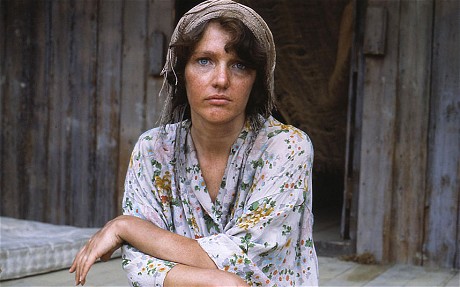
How familiar were you with Doctor Who at the time?
Oh, very! I watched the first episode. I think I was 12 or 13 when it first came out. It was a bit of a Saturday afternoon ritual with my family. We were never allowed food in the living room but we were allowed it during Doctor Who, and the trolley came in with the cakes and the baked beans and the boiled eggs and we sat, the four of us, to watch it on a regular basis.
Was there a one-line pitch for Leela? How much did you know about the character during the audition process?
Not very much. Instinctive, not-of-this-world, although human, and a companion. That was kind of all I knew. I didn’t know about the costume or anything. Once you got the part the costume was then discussed. You know, feminists have asked me how did I feel about it, but I’m not sure it was gratuitous. She’s a woman that was living in the jungle, what else could she wear but skins that were very easy to move in? I think there was a reason for dressing her that way – maybe gratuitous to keep me in it! But I think it was part and parcel of what helped Leela to be such a success. When you can identify so strongly with a character. It did make her otherworldly in a way that jeans and a t-shirt wouldn’t have done.
Although having Leela in jeans and a t-shirt might have been quite fun if they could have got that far…
Well, Horror of Fang Rock I went into a polo neck and belt and trousers. I wanted to wear huge clothes that fell off me, blokes’ clothes, but they wouldn’t let me do that.
You bridged two quite different periods in Doctor Who. From your perspective, was there much of a difference between the producer-ships of Philip Hinchcliffe and Graham Williams?
Yes, I think there was. I think Philip is incredibly talented at hauling a group of creatives together, and not frightened of being unpopular sometimes. I think Graham wanted to be everybody’s best friend and was much more hands-on and on the floor. I felt very safe with Graham but I’m not sure he was quite ruthless enough to be producer at that time at the BBC.
The bridging story, which really features elements of both eras, was Horror of Fang Rock. It was a bit of a troubled production. Do you have many memories of making it?
Paddy Russell directed it, and Tom wasn’t the most welcoming to her. Called her ‘sir’ the whole time. Tom and I had a little contretemps over a particular shot that I wanted filmed one way, the way we’d rehearsed, and he wanted filmed another. I, for the first time really, put my foot down and just went, ‘can we do what we rehearsed?’ and there was definitely tension in the air. I went up to him afterwards and said, ‘I’m sorry, but I think that for the programme that shot was necessary,’ and he went, ‘that’s alright, love,’ and I thought, ‘I wish I’d done that weeks ago!’
But now we get on – I consider him a really dear friend. He’s mellowed and he’s apologised for being difficult and complicated to work with. I don’t really want my lasting words about him to be that he was bolshy at the time, because he’s so adorable now!
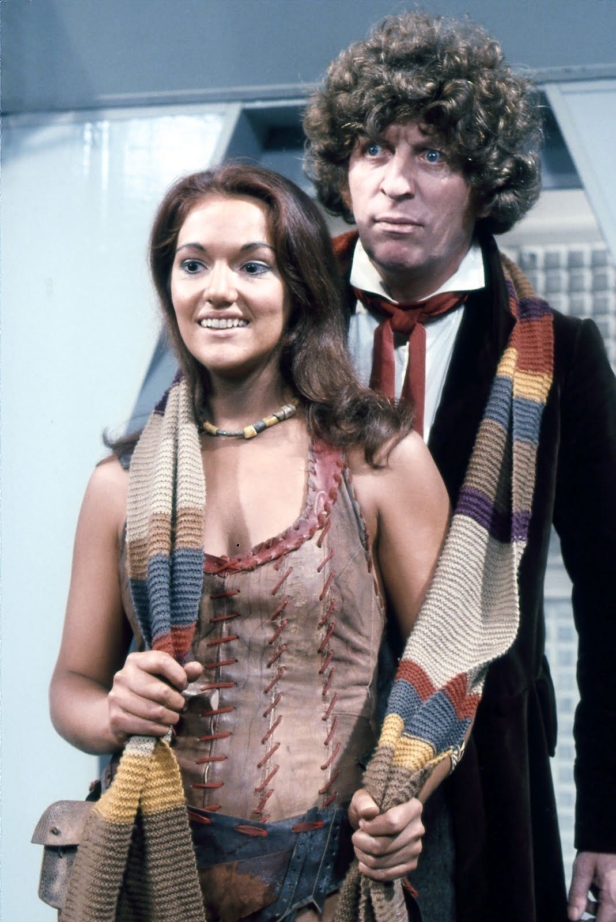
On the subject of Paddy Russell, she was one of very few women to direct classic Doctor Who, even Doctor Who in general.
She was the first, I think, female producer at the BBC.
How did you find working with her?
I found her a little… unbending. But I think, probably, she had to be strict and come in under budget and with time to spare because she was a woman. I don’t think back then I quite appreciated quite what a ground-breaking person she was. I found she clipped one’s wings a bit, rather than helped you fly, because she’d got her camera schedule worked out before she came into rehearsals. So consequently, what we had to offer wouldn’t necessarily get filmed because she was going, ‘I need a reaction from you, I’ve got a close-up of you here, can you give me a reaction?’ rather than seeing where the reaction came naturally.
People mentioned the rat in The Talons of Weng-Chiang and the CSO in Underworld, things that maybe didn’t really work, but did you have moments that you thought really did work?
I actually quite like the rat in Talons! It is Leela’s only scream, being eaten by a giant rat. I don’t want to diss the giant rat, I think he brings a smile to everybody’s faces. The Colour Separation Overlay, however, was an absolute fucking nightmare to work with, to be honest. We were trying to hit marks and not knowing what we were walking through. It was an experiment that didn’t quite work, I don’t think…
Leela’s leaving scene in The Invasion of Time comes as a bit of a shock but you and Chris Tranchell [as Andred, who Leela falls in love with] do good work in suggesting more of a relationship. Were you working to invent something that wasn’t scripted?
Yeah. Absolutely that. Bless you for noticing. That’s exactly what we were doing. Also, even the night before we shot that, Graham came up to me on the floor and said, ‘you can change your mind, you can run into that TARDIS, we can rewrite it overnight, please stay!’ Very flattering, but it just wasn’t feasible. I wasn’t happy and I’d been offered Portia in The Merchant of Venice, desperate to get back to theatre again.
Not too long afterwards, you starred in The Omega Factor as Dr Anne Reynolds. Was there a big difference in that this time you were the star of the show, you weren’t an assistant?
It felt like that at the time, but I’ve looked back – because we’re doing them with Big Finish – and I was still a rather laughing-at-the-men’s-jokes, serving the food, pouring the drinks type of woman, wasn’t I? It wasn’t all ‘scientist Anne Reynolds’, it was kind of ‘woman scientist Anne Reynolds’.
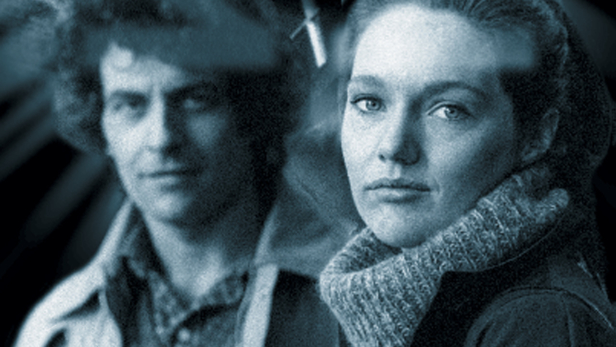
Both Doctor Who and The Omega Factor got the [Mary Whitehouse founded] National Viewers and Listeners Association’s backs up – did you have feelings about this at the time, or now with hindsight, about their response to the shows?
Well, at the time we rubbed our hands together because it added two million onto the viewing figures! I’ve only recently found out that another series of Omega Factor didn’t happen because of her and that does piss me off, because it’s quite tame really.
In 1993, you came back as Leela for Dimensions in Time, Doctor Who’s 30th anniversary Children in Need crossover with Eastenders.
[Groans]
How was that experience?
Now that is a script I didn’t understand! Really, really didn’t…I kind of gave up on it after a while, it just was impossible to comprehend! And the costume made me look like a sack of potatoes… I just thought, ‘think of the charity and do it’.
I think that was the first Leela scene I ever saw…
I’m amazed you ever watched another one then!
Shortly after that you were again involved in the world of Doctor Who in the PROBE series with Caroline John as Liz Shaw. Very little budget but some real talent in there – how was working on that series?
The very first one was quite nerve-wracking because I replaced somebody – I’m not sure who – at 24 hours’ notice. Thanks to Colin Baker, I think, who said that he knew someone who could turn on a sixpence – I wish I could anymore, but I can’t – and learn something quickly. So that’s how I got involved with all that.
How did you find working with Caroline John?
Oh, lovely! She was an absolutely adorable woman, and sadly missed. Very funny, very wise, very sweet, kind, careful, caring – I liked her a lot. I think she only gave Liz a pipe because she was an avid smoker! Took her off in the end, didn’t it?
With Big Finish you’ve done Doctor Who and later The Omega Factor, and other things as well – did you take any persuading to get involved with Big Finish, or were you immediately on board?
To begin with I read all the scripts extremely thoroughly before accepting them, but found them to be of such good quality. I’ve taken to going, ‘I’ve got these days free, do you need me?’ because my schedule’s quite packed, they usually say, ‘yes, please come in.’ I take the scripts sight-unseen now because I love them. I love them. I love working with them. I think David Richardson is an absolute genius producer. You hardly know he’s there, he just quietly moves around making sure everybody’s happy. If anybody is a diva, if anybody plays up, they’re just not employed again. It’s a pre-requisite of the job that you have to be quite a nice person to work with!
More recently, you appeared in Mark Gatiss’s adaptation of MR James’s ‘The Tractate Middoth’, as a Ghost Story for Christmas. Did you enjoy that?
I loved it! When I got the script, I said, ‘who’s playing my younger self?’ and he went, ‘you!’ He said, ‘we can do wonderful things, don’t you worry!’ ‘Can you ride a bike?’ ‘Yes!’ – but I hadn’t been on a bike for I don’t know how long! So yeah, it was a challenge, but I loved it. I absolutely loved it.
There’s a possibility that I might be directing a film soon. I spoke to [Mark Gatiss] and said, ‘what did you do? Because you went from in front of the camera to behind it in the blink of an eye. Is there a sort of crash course I can do?’ and he said, ‘first of all you’ll be amazed at how much you know because you’ve been doing it for 45 years, and secondly just get a brilliant director of photography and be very clear about what atmosphere you want and it’ll just be done, it’ll be taken care of, that’s their job!’ So that’s what I’ll do.
You played a strong woman in Leela, but also a lot of others throughout your career. How do you think the TV landscape nowadays is in terms of gender equality, in terms of roles for women?
I think it took a real dip at the turn of the century. A real dip. But I think women are… there’s a tidal wave coming, if not a tsunami. There are many more women writers that we’re seeing. Female casts of Julius Caesar, King Lear. The soaps are now moving back to the matriarch leader and away from the East End gangster. I think we’re going to be alright, but we’ve had to fight for it. That’s one of the reasons I write now.
Get all the latest sci-fi news with every issue of SciFiNow.
